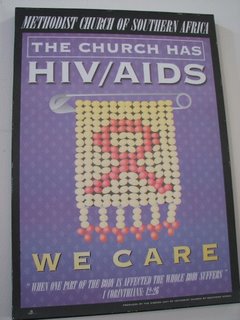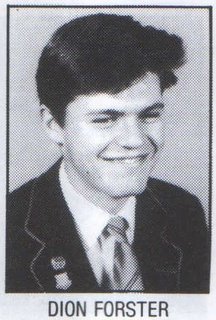 Why has the South African Church become so silent on matters that blatantly negate and deny the love, mercy, justice, and grace of the Kingdom of God?
Why has the South African Church become so silent on matters that blatantly negate and deny the love, mercy, justice, and grace of the Kingdom of God?
As a minister of a denomination that was very prophetic (both in word and deed) during South Africa's apartheid era I have found it alarming to gauge the general lack of prophetic witness in Southern African Methodist Churches at the moment. (For a more detailed, although admittedly somewhat hagiographic, account of some of the Methodist Church of Southern Africa's prophetic stances please read the following paper that I presented at the Oxford Institute).
My friend, Wessel Bentley attempted to have a resolution passed at our recent Methodist Annual Conference that noted concern and alarm about a couple of things:
1. Concerns about the minister of health's (Manto Tshabalala Msimang) general conduct and the questions surrounding her management of public resources.
2. Grave concerns about how the South African health services are dealing with the pandemic of HIV / AIDS - it needs to be remembered that we have the highest HIV infection rate in the world!
Instead, we ended up with a vague, indirect, empty resolution that will not change or impact significantly on health care for people who are dying of a disease that we can stem! Sadly, it was members of our own Church, some who used to be pastors in Churhces, some who were leaders of the apartheid struggle, who now drive Mercedes, BMW's and occupy high positions in the new ANC government, some who win lucrative tenders for Government contracts, who were the main proponents of protecting the government, and seeking to cover over and silence the Church's call for radical action.
I remember some years ago (1992) as a young minister being 'hauled over the coals' by my Bishop at the time, Rev Peter Storey, for participating in a student march against the Apartheid government. The protest action was quite controversial, our in service training convener (Rev Paul Verryn) took us to the march in Potchefstroom on the University campus. Peter was concerned that many of us were being co-opted, uncritically, into movements that did not necessarily have the good of the people at heart. Paul of course was trying to help uncritical young white fundamentalists like me to realise that preaching the Gospel had radical consequences for the way in which society is structured! You cannot preach love, equity, justice and acceptance, without doing something to try and bring it about! However, there were some real issues among the organizers of the protest, and so Bishop Peter admonished us with these words (or something close to them) - "When the struggle is won, and the majority take power, and the injustice continues, then we shall see who the true prophets are - those who fall silent, or are co-opted, will be shown for who they truly are. True prophets will speak, not because of where they are, but because of who God is - a true prophet always speaks, and lives, the truth of God regardless of who is in power".
Let us never forget, this struggle is about someone who is lying in a bed, in a shack, in a rural area of our country, not receiving primary health care because of inadequate high level, and local, management! As the media, leading up to the Conference, reported - the health department has huge unspent budgets for equipment, staff and medicines, yet our clinics and hospitals are empty, our doctors and nurses are fleeing South Africa in search of better pay and better working conditions, and antiretrovirals are not reaching the poorest of the poor! Thankfully, the minister of health can get herself bumped to the top of the donor list, and disregard the fact that he liver damage was caused by Alcohol abuse (or so it is alleged, I cannot be certain).
Wessel, and Comrade Manto Matsepe, also sent a resolution to Conference through DEWCOM noting with concern how many ordained Methodist ministers are now serving in senior positions, and in the official structures, of the ruling party in South Africa... It was toned down... In the past we did not allow Methodist clergy to hold political office, now we "request them to consider their motives for doing so, and consider whether they are compromising the Church's prophetic witness". Again, this is my paraphrasing of the resolution. Of course we need Christians to be active in politics, in fact we need Christians to hold political office, but I am not convinced that we need Christian ministers to do so - who must remain objective, free to speak and challenge, yet also open to affirm and assist. The office of a pastor, the power of the pulpit, and the station of a servant in society, need to remain very carefully located in a 'God space' - political, but not aligned to party politics.
Yet, sadly, the Church is silent. And, let me say, it is not our leaders who are silent, it is the Church! I am amused by how we tend to sit on both sides of the fence when we speak of 'the church'. When it suits us we emphasize the role, importance, and power of the term that Rick Warren and Bill Hybels (Willowcreek) have made so popular - the local Church! Yet, when it comes to actually doing something about it we turn our eyes to the leaders of the Church, expecting them to be the one's who set the pace for mission, witness, and community transformation. I remember doing a SYNOD Bible study a few years back in which I challenged the SYNOD to realize that 'structures' don't do mission! People, filled with the Spirit of God, convicted by the truth of the Gospel of Jesus Christ, living in areas of need and concern do mission!
Something I have had to repent of is my tendency to want to blame others - I find it easy, as many others do, to lament how others don't do the things that I should be doing.
On this blog, more than once, I have made critical comments about the silence of the United Methodist Church about one of its members gross misconduct and un-Christian behavior, George W Bush (yes, he is a Methodist)! However, I need to repent that I have been slow to criticise my own silence of our State President (who has indicated that he is a Christian) when he removes people who ask tough questions, sidesteps issues of national concern (like the accusations of criminal misconduct against the National Police commissioner Mr Selebi).
I am silent. Forgive me Lord! I am sure you are much more vocal, much more prophetic. I am sure that even now you are setting the captives free, healing the sick, proclaiming good news and jubilee for the impoverished, and not allowing injustice to go unnoticed. Give me the courage to be part of your work in the world, your mission, your uncompromising love.
A fantastic new book is out - I have read some reviews, and already ordered my copy. As with all Mclaren's works I am sure that it will ruffle some feathers: Everything Must Change: Jesus, Global Crises, and a Revolution of Hope.

For a little taste of Mclaren's prophetic perspective (a separate commentary from that in the book) you can read the article below from the soujourners website 'God and politics'.
I remember about eight years ago when then presidential candidate George W. Bush repeatedly claimed that he would restore honor to the presidency, soiled as it had been by our previous president's infamous affair. I remember hoping he would succeed. But a new kind of shame has come to the office and to our nation as reports surface about our government's secret authorization of torture. We all share in this shame.
Conservative columnist and blogger Andrew Sullivan expresses what many of us feel. He reminds his readers:
... my first response to reports of abuse and torture at Gitmo was to accuse the accusers of exaggeration or deliberate deception ... It struck me as a no-brainer that this stuff was being invented by the far left or was part of al Qaeda propaganda. After all, they train captives to lie about this stuff. Bottom line: I trusted this president in a time of war to obey the rule of law that we were and are defending.
Sadly, he laments, that trust was betrayed:
And then I was forced to confront the evidence. He betrayed all of us. He lied. He authorized torture in secret, and then, when busted after Abu Ghraib, blamed it on low-level grunts. This was not a mistake. It was a betrayal.
The word "betrayal," of course, recalls Moveon.org's Sept. 26 ad. Many considered the pun childish at best, politically unsavvy at least, or worse. There was a rush to condemn anyone who failed to condemn the ad. But Sullivan's use of the word strikes me as anything but childish.
Our nation's reputation, not to mention that of the presidency, has been dishonored by this betrayal of trust. Honorable people - conservative and liberal, Republican and Democrat - need to follow Andrew Sullivan's example, coming together to express our grief and outrage about the political hypocrisy and betrayal to which we have been subjected by people we elected.

This is challenging stuff! I am also currently reading the book of my friend Joerg Rieger "
Christ and empire". This is a much more scholarly, carefully researched, and hard hitting prophetic theology! Joerg, who is from Southern Methodist University, will be visiting us early next year. He is coming to do some sabbatical work at the University of Kwazulu Natal (that has the exceptional Theology and Development program), and he will take some time to visit John Wesley College whilst here.
Technorati tags:
prophetic,
Mclaren,
Selebi,
MantoLabels: AIDS, HIV, Mclaren, politics, prophetic, vision
 warned.
warned. 







 .
.
 .
.




